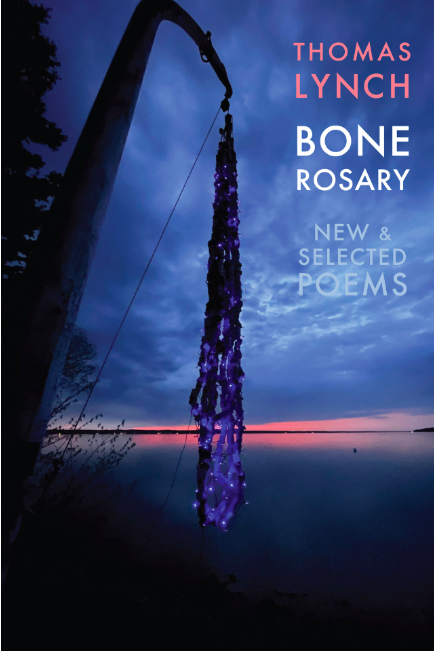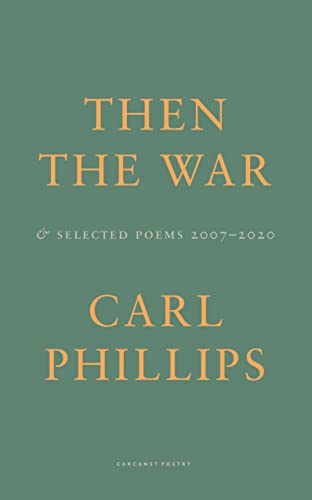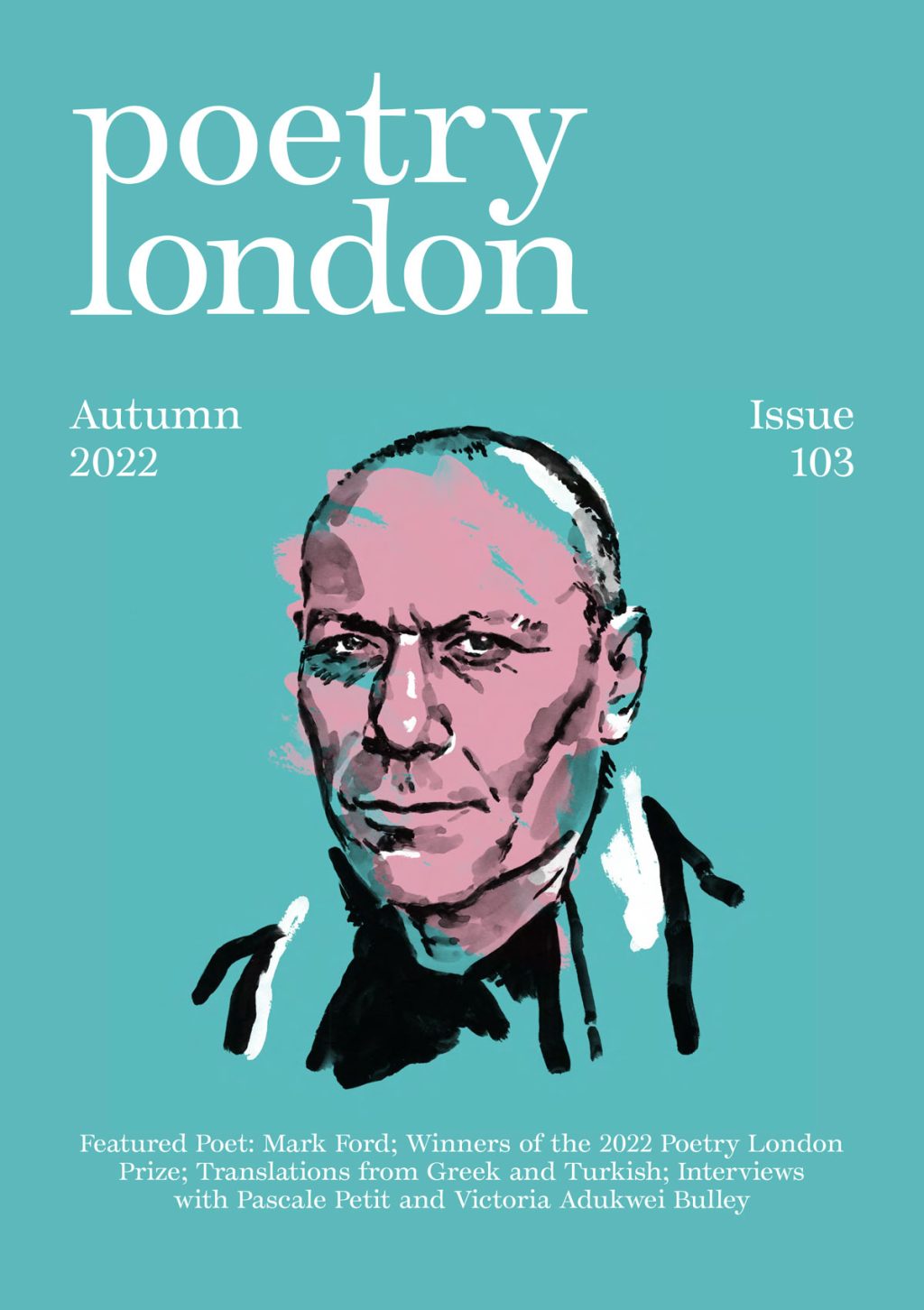Seeing is Believing
David Wheatley on how two poets explore pastoral imaginations, the life of the senses and the language of faith
David Wheatley
-

Bone Rosary: New & Selected Poems
Thomas Lynch
Bloodaxe • £14,99 -

Then the War: And Selected Poems 2007–2020
Carl Phillips
Carcanet • £14,99
A reader of J. M. Synge or the Blasket Island writers of the early twentieth century cannot help but notice how much closer life in the West of Ireland seemed to the American east coast than to Dublin. A contemporary poet who exemplifies this truth is Thomas Lynch, whose great-grandfather was an Irish immigrant to the US, and whose two great themes are the undertaking business, in which he spent his working life in Milford, Michigan, and his frequent return trips to an ancestral cottage in Moveen, Co. Clare. Lynch is a poet of small-town life, its agonies and exaltations, and very much a citizen of Patrick Kavanagh’s parochial rather than provincial world – somewhere sufficient unto itself and not in need of validation from the sophisticates of a distant capital. An arm around the reader’s shoulder by way of narrative intimacy – ‘Here is how it happens’ – is a frequent gambit. In ‘Wormwood’, Lynch lists some of the grimmer ends that have brought corpses to his door (‘The one who took a pistol in his teeth / and blew his brains across the family room’) before announcing ‘There were, of course, the usual theories.’ The Frostian gesture signals the poet as someone in the know, with the ear of the community, but not about to spill its secrets. A voice we can trust, as the blurbs say.
Lynch’s early poems affect a jaunty-grim tone, with their drownedfisherman who ‘makes a lovely summer corpse’, the poet’s dying father flirting with a waitress, dry appraisals of married sex, and the plangent yet strangely upbeat self-portrait as ‘a sad man with a thin heart dying / from complications of a complex race of men’. The levels of joie de vivre are consistently higher than in Hardy, that superficially similar chronicler of creeping mortality. Reading the less successful poems though, we sense that funereal gloom is the least of Lynch’s challenges. ‘Grimalkim’, the title poem of his second collection, is an over-extended curse on a cat and her ‘whorish treacheries’, ill-judged and unfunny. A poem about pissing on the front lawn is all very Iron John, another curse poem on an ex-wife belongs on an answerphone tape, and a foray into the ekphrastic poem (‘Art History, Chicago’) is an exercise in cultural tourism.
The central achievement of Bone Rosary is to be found in poems such as ‘The Moveen Notebook’, written for his Clare cousin Nora Lynch. This is a gripping tale of family history and migration, holding generational continuity and transatlantic separation in careful balance, and finding an image for the precariousness of the human condition in visions of death by freak wave on the Clare coast. Other strong poems would include ‘Walking Papers’, ‘Still Life in Milford – Oil on Canvas by Lester Johnson’ and ‘Aisling’, with its retreading of abandonment in a cosy, private space – ‘a dark so black / he could never, ever / let her into it’.
Then there is the question of religion. Reading the final stretch of Bone Rosary, where questions of faith come urgently to the fore, I was reminded of Seamus Heaney’s Oxford lecture on Philip Larkin, ‘Joy or Night’. In one of his few negative moments as a critic, Heaney condemns Larkin’s ‘Aubade’ for its comfortless vision. Heaney’s friend Czesław Miłosz also attacked Larkin, but while Miłosz was a traditionalist who thought Larkin’s atheism was untrue, Heaney appears to base his dislike on nothing stronger than Larkin’s failure to cheer him up. Heaney’s Catholicism involves a socio-cultural portrait of the world of his childhood, not a statement of religious dogma. And with few exceptions, this has been the approach to religion of most Irish poets in Heaney’s time and since. Lynch’s treatment of religion is different. A poem on a school shooting stings Lynch into a Jobian crisis of faith (‘How’s God all loving and all powerful / when all week long we’ve buried children?’) while ‘What Shall We Say?’ belts out a kyrie eleison (‘Say God is love. Love God. Love one another.’). The artistic gamble here is that the language of faith will possess sufficient authority to win over readers who may not share the poet’s faith. Failing that, the poems become literally ritual gestures.
A mark of the impact of this religious turn on Lynch’s work is the withering on the vine of his more ribald humour. Donald Trump may exist somewhere beyond all satire, but ‘Franchise 2016’ is not the poem that subject requires. Lynch often strikes the pose of wise old Nestor, dispensing wise counsel to taking the edge off life’s trials. The limits of this template are clearly on show in ‘To His Grandchildren as Dark Draws Hither’ and ‘She Instructs the Brethren on the Laws of Love’ (‘do not ask Why if, after you’ve made love / she weeps quietly’), which reminded me of Larkin’s ‘Deceptions’, to invoke that poet again. Speaking of liturgical language though, Lynch sprays a fair bit of Latin about, but makes an unfortunate mistake in ‘Lessons from Berkeley’ with ‘esse est percipere’ (to be is to perceive), when what Berkeley wrote was ‘esse est percipi’ (to be is to be perceived). Seeing is believing, but if the visions in Lynch’s religious poems could have been evoked more powerfully, the question of whether I shared their underlying faith needn’t have bothered me as much as it did.
Carl Phillips was born in 1959 and Then the War is his eighteenth collection. Despite his cascading output he has lacked a British publisher until now, and in Then the War and the selection of recent work that follows it, we encounter a poet very much in medias res. Another title that might work for this volume is Self-Portrait as Desiring Stream of Consciousness. A Phillips poem will typically paint an alluring landscape, add a statement about love and desire, trail off in an ellipsis before reaching any conclusion, then rouse itself for a final epiphany on transience and endurance. In ‘Little Shields, in Starlight’, these ingredients take the form of a pastoral setting amid catalpa and dogwood leaves while the poet remembers how ‘It was like / sex when, push the tenderness to either side of it, it’s just sex; hardly sex at all…’; and shouldn’t there be some record of this, he wonders, even if that’s all there is, even if death means ‘we stop moving forever’. Driven to memorialize the life of the senses, Phillips is an undiluted aesthete, whose poems could countersign Pater’s belief that the point of art is ‘to give nothing but the highest quality to your moments as they pass, and simply for those moments’ sake’.
Self-repetition is a question for any poet, let alone one as prolific as Phillips, but if desire is a monster in need of constant appeasement, ‘perhaps / the man-hero is not the exceptional monster / but he that of repetition is most master’, as Wallace Stevens said. In ‘So the Mind Like a Gate Swing Opens’ Phillips aligns longing and despair and finds the repetitions of ephemeral pleasure to be their own reward: ‘What’s / wrong
with me, I used to ask, but usually too late, and not / meaning it anyway. He touches me, or I touch him, or don’t.’ The partners in question are prompts for abstract meditations on love and loss, not rounded character sketches. Detachment, loneliness and forgetting are the fixed stars in these poems’ firmament, with a flaring comet of connection. But the other remains ultimately elusive.
The Selected Poems half of this book draws on seven volumes, and it would be quite a task to chart any major development from one volume to the next. There are poets – Medbh McGuckian, John Burnside, and Peter Reading spring to mind – who will go through phases of intensely rapid publishing in ways that belie the usual expectations of novelty and breakthrough from book to book; Phillips is evidently of this tribe. Which is not to say these poems lack self-reflection. He has been compared to Jorie Graham, who knows a thing or two about the meta-poem, but I have never seen Graham try what Phillips does in Then the War, where he quotes an old poem in a new poem, and begins to critique it (‘and I’d call it a poem, and it looked like one, but how it felt was more like saying aloud the words rescue me…’).
As pastoral imaginations go, Phillips’ is unreconstructed. Here the Paterian comparisons holds good again as the poet finds the natural world not in a state of environmental despoliation and global warming, but a place of classical groves and bowers, where gods and lost boys pursue the destiny of the flesh. These landscapes are often torn by conflict, but ‘Some say the point of war / is to make the need for tenderness // more clear’, as in Homer’s Iliad. The Housmanian pathos of lost innocence finds itself communicating in archaism, as in ‘Storm’, where ‘he taketh my hand / in his’. But what is death? ‘death is a young man with a habit for using / one side of his mouth to blow his hair slightly / up from his brow’. Achilles before rather than after the Trojan war, perhaps.
‘Sometimes it feels like being a carousel horse’, Phillips writes in ‘So the Mind Like a Gate Swings Open’, and his favourite themes do go round and round with some regularity. He is the laureate of the unrepeatable present, an anti- Faust happy to risk hell by exclaiming ‘Beautiful moment, do not pass away!’ all day long. Yet the most memorable poems here are most often those born of the ache and confusion over what comes next, as in the lovely Schuyleresque ‘This Far In’. Giving up on singing ‘When I Change My Life’, the poet instead hands himself over to the freedom and nonchalance of the breeze outside his window: ‘Speak to me; speak into me, / the wind said, when I woke / this morning. Let’s see what happens.’
David Wheatley’s novel Stretto is published by CB Editions.


